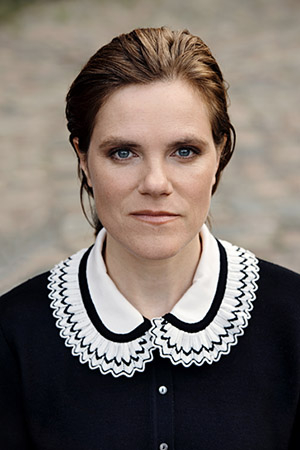Gallery
All Pictures (17)Biography
Fritzi Haberlandt, born June 6, 1975, in East Berlin, attended actor's training at Schauspielschule Ernst Busch in Berlin where she met American theatre pioneer Robert Wilson and played in Wilson's 1998 production of "Dantons Tod" (1998) at Berliner Ensemble. Haberlandt's strong first performances were immediately well received as "Theater heute" named her "Best new actor" two times in a row, in 2000 and in 2001.
In 1999, Haberlandt became a cast member of Schauspiel Hannover but went to Hamburg's Thalia Theater where she worked as cast member from 2000 to 2006. Under director Michael Thalheimer, Haberlandt caused a stir in a controversial production of "Liliom", among others. Furthermore, Haberlandt won the 2003 Alfred Kerr actor's prize for her performances in "Zeit zu lieben Zeit zu sterben" und "Liebelei". Since the start of the 2006/07 season, Fritzi Haberlandt is regularly seen as a cast member of Berlin's Maxim Gorki theatre.
From 1999 on, Haberlandt starred in several striking movie parts. She won the Bavarian film prize for "Best new actor" for her performance in Rainer Kaufmann's "Kalt ist der Abendhauch" ("Cold Is The Evenig Breeze") based on Ingrid Noll's novel. In addition, the part of an inconspicuous student in the comedy "Liegen Lernen" ("Learning to Lie") won her the German film prize for "Best supporting actress". She was also praised for subtle and unsentimental portrait of a blind woman in Lars Büchel's tragicomic love story "Erbsen auf halb 6" ("Peas at 5:30"). But despite her movie success, Haberlandt continues to perform on stage. While she was seen in a small, but significant part in Detlev Buck's children's film "Hände weg von Mississippi", Haberlandt at the same time starred in a leading role in "Die Leiden des jungen Werther" at Maxim Gorki theatre.
For her leading role as a spinsterish ballet teacher in Hendrik Handloegten's TV movie "Ein spätes Mädchen" Haberlandt won the Hessian Film Price in 2007, followed by other important parts in feature films like Martin Gypken's "Nichts als Gespenster" ("Nothing But Ghosts"), Andreas Kleinert's "Freischwimmer" ("Head Under Water") and Bernd Böhlich's "Der Mond und andere Liebhaber".
In 2009/2010, Haberlandt guest-starred in TV productions like "Die armen Kinder von Schwerin" – a feature-length episode of the "Polizeiruf 110" series –, Bernd Böhlich's comedy "Krauses Kur", as well as "Tote Männer" and "Wie einst Lilly", the latter two being feature-length films in the popular "Tatort" TV-series. She returned to the big screen with "Das Blaue vom Himmel", followed by the female lead in the romantic comedy "Eine Insel namens Udo", which opened in June 2011.
Also in 2012, she had a supporting role in the tragicomedy "Transpapa", the story of a teenage girl who seeks out her transsexual father. Haberlandt then starred opposite Mario Adorf in "Die Libelle und das Nashorn" ("The Rhino And The Dragonfly"), playing a young author who spends a memorable night with an aging movie star.
A lighter role came in the 2014 children's film "Quatsch und die Nasenbärbande" ("Fiddlesticks"), where Haberlandt played the mother of a spunky young heroine. That same year, she appeared on TV in the "Polizeiruf 110" episode "Käfer und Prinzessin", portraying a woman living on an alternative rural commune whose partner is murdered. She also appeared in an episode of the cult comedy "Der Tatortreiniger" ("Crime Scene Cleaner") and the small-town TV drama "Krauses Geheimnis". Her performance in the TV adaptation of Siegfried Lenz's "Der Verlust", in which she played the long-time friend of a mysterious protagonist, earned her critical acclaim.
Widespread attention followed with the feature film "Nebel im August" ("Fog in August," 2016), based on true events, which dealt with the Nazi euthanasia programs. In it, Haberlandt portrayed a nurse trying to save a child from being murdered. For this role, she received the German Film Award for Best Supporting Actress in April 2017. Just two months earlier, in February 2017, the children's and youth film "Timm Thaler oder das verkaufte Lachen" ("The Legend of Timm Thaler or The Boy Who Sold His Laughter") was released in cinemas, featuring Haberlandt in a supporting role as the protagonist's mother.
In the following years, Haberlandt focused mainly on television. From 2017 to 2025, she played a key role in all five seasons of the hit series "Babylon Berlin", portraying a landlady who supports the resistance against the Nazis. In "Berlin 86" (2018) and "Berlin 89" (2020), she played a doctor in East Germany who dreams of escaping to the West. In the biographical drama "Martha Liebermann – Ein gestohlenes Leben" (2022), she portrayed Hanna Solf, a politician and member of the resistance against the Nazi regime.
Alongside her screen work, Haberlandt remained active on stage. In 2023, she received the prestigious German theatre award Der Faust for her performance in the play "Angabe der Person" at the Deutsches Theater Berlin.
She returned to the big screen in 2025 - nearly eight years after her last cinema appearance - with "Wilma will mehr", a warm, humorous story of self-discovery. In the film, she plays a woman in her mid-forties from the East German countryside who leaves her unfaithful husband behind and embarks on a new, unconventional life.
